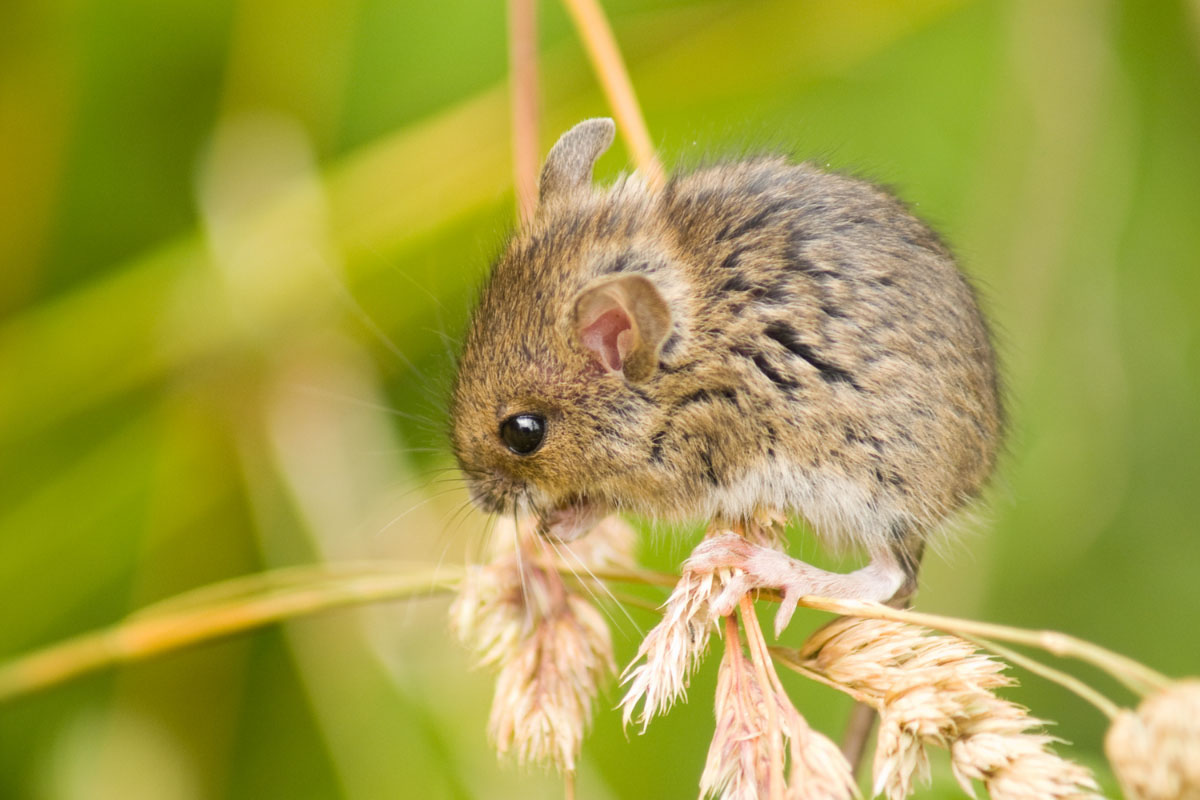- CALL US: 905.318.1242
Field Mice
At first glance, field mice (mus musculus) look like house mice (mus domesticus). Both species have a body size of around four inches, with their tails adding up to an additional four inches to their length. However, house mice have a uniform grey-brown coat while field mice have a white belly. Field mice are also more slender with a weight of 13 to 27 grams.
Diet
In the wild, field mice consume a highly diversified diet consisting of seeds, berries, flower buds and invertebrates like earthworms and insects. If they are close to a farm or agricultural community, they will also eat corn and seasonal root vegetables like zucchini, green beans and carrots. If they find their way into your home, they will eat most types of human and pet foods.
Like other species of mice, field mice have a high metabolism and will eat up to 20 times a day. Once they find a sustainable food source, like a grain storage area in a barn or kitchen in a home, they will build nests in areas that provide easy access to a quick meal.
Where to find them
Field mice normally live in fields, meadows and areas with plenty of light brush, so you’re more apt to find them in rural locations. They dig burrows to provide shelter and safety from predators, so if they get into your home or cottage, they will go into the walls or under floorboards to build nests and reproduce.
Reproduction rate
Field mice have been referred to as breeding machines. Females can give birth to a litter of anywhere from three to 14 babies up to 10 times per year and can mate immediately afterward. On average, a single female field mouse could add 32 to 56 babies to the colony every year. The offspring are sexually mature at six weeks old, at which point they can start reproducing. One mathematician calculated that within two years, a pair of field mice could infest your home with over 5,000 offspring!
Common diseases
There are a few potentially serious conditions that field mice can transmit through their nesting materials, urine, feces and/or saliva. They include:
- Leptospirosis
- Salmonella
- Lymphocytic choriomeningitis (more commonly seen in house mice)
To protect your family and pets from being exposed to mouse-borne illnesses, take corrective action as soon as you notice signs of an infestation, which we’ll cover in the next section.
Signs of an infestation
Being small and agile, field mice can pass through entrances as small as a quarter-inch in diameter. After getting into your home, they will set up camp in the walls, attic and even behind furniture or appliances.
Below are some common signs of a field mouse infestation:
- Unusual noises like chewing and scratching within your walls or in the attic
- Grease marks from their fur along baseboards, furniture legs, and other well-traveled routes
- Droppings, especially in the vicinity of the kitchen
- Footprints and tail marks in dustier areas
- Teeth marks on boxes and plastic containers with food
- A strong urine smell close to nesting sites
- Gnawed wood surfaces, paper, and electrical wires
How to keep them out of your home
Field mice have compact bodies and can climb, jump and swim, so any rodent-proofing measures need to be extra-thorough. This includes:
- Keeping food in the refrigerator or a chew-proof container made from glass or metal
- Repairing any torn door or window screens, no matter how minor the damage
- Closing off all gaps around cables, pipes, or wires running into the home through the walls or foundation
- Placing screens across your chimney openings
- Installing weather stripping around your doors and windows
- Keeping food waste and household garbage in tightly sealed containers until collection day
- Removing any vegetation or greenery close to the house, so that the mice have nowhere to hide while they try to figure out a way in
Need field mice control services?
Despite their small size, field mice can do tremendous amounts of damage to your property. Their urine and droppings may spread disease and their propensity for chewing can damage the home and even result in a fire hazard. Due to their rapid reproduction rate, the best course of action is to call a professional pest control company.
At Action Pest Control, we have years of experience dealing with both urban and rural field mice infestations, and will use methods that don’t endanger your family or pets. We are a trusted source of affordable and effective extermination services in and around Hamilton, Burlington, and Oakville. When field mice move in, contact us to help you get them out.








